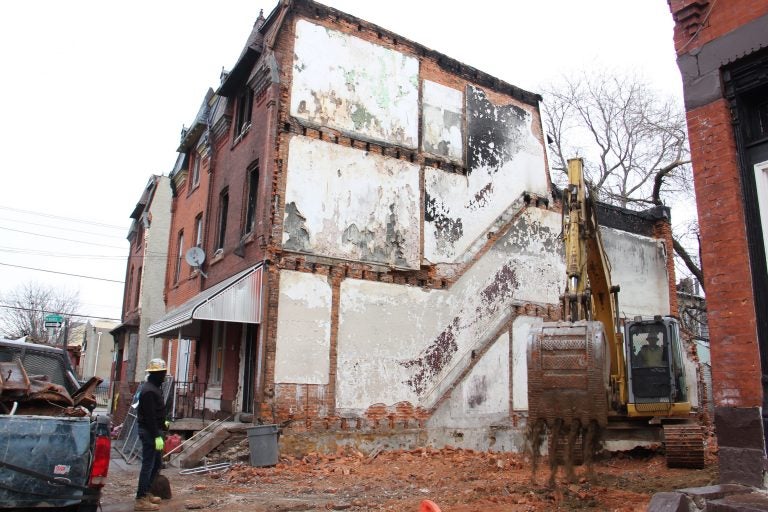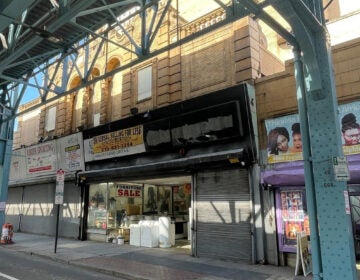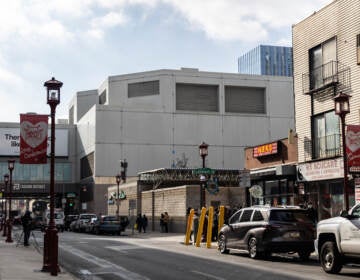L&I commissioner: Boarding houses aren’t going away. Philly neighborhoods need to make room for them
In many parts of the city, including North Philadelphia, rooming houses are common.

A backhoe operates on the lot adjacent to 1855 N. 21st St. in Philadelphia where four people died in a fire last month. (Emma Lee/WHYY)
Philadelphia’s Licenses & Inspections Commissioner David Perri thinks that the city’s zoning code is “inadvertently” encouraging property owners to illegally carve dwellings into multi-unit boarding houses. The regulations skirted by such scofflaw rooming houses are designed to prevent tragedies like the fire that killed four residents of one such makeshift apartment complex in North Philadelphia last month.
“The interesting thing is that rooming houses are not allowed in residential zoning districts,” said Perri at a budget hearing L&I held on Tuesday. “I believe that to be problematic because you can’t legally put these in some residential areas. Then what you are doing, inadvertently, is encouraging folks to create illegal rooming houses.”
Perri made his comments in response to questions from Councilman-at-large Bill Greenlee, who chaired the hearing and opened it by immediately asking the commissioner for updates on the North Philly fire case.
In many parts of the city, including North Philadelphia, rooming houses are common. Unmarked and largely indistinguishable from neighboring rowhouses, these de facto affordable housing complexes offer a market-driven answer to a rampant need for low rent.
In a country where only 25 percent of eligible households receive housing subsidies, it’s hardly surprising that Philadelphia, where more than a quarter of the population subsists below the poverty line, finds itself struggling to provide housing for its poorest residents.
But both rooming houses and single-room occupancy (SRO) buildings are hard to establish legally under Philadelphia’s zoning code. To legally operate a rooming house requires a special exception from the Zoning Board of Adjustment, regardless of whether the building is located in an area zoned for multi-family or single family residential use.
An SRO is illegal in any single-family district and requires a special exception in multifamily districts.
Former city councilman Frank DiCicco, who is now the head of the Zoning Board of Adjustment (ZBA), has made it very clear that he won’t look favorably upon those looking for such special exceptions.
That’s the way neighborhood groups like it, and they often push back against zoning categories that would allow group living without a trip to the ZBA — categories such as IRMX or CMX-3.
District council people tend to align with such civic groups, whose members tend to be heavily involved in local politics.
But Perri argued on Tuesday that making the rooming house difficult to establish in residential zoning categories is just pushing them into the shadow economy, out of the view of regulators.
Underground business, by their nature, attract operators unafraid to flout the law. As the Philadelphia Inquirer reported, the operator of the rooming house that burned is alleged to have used his properties to launder money he stole from drug traffickers.
“I think we need to take a hard look at zoning and whether or not we need to find ways of putting rooming houses back into residential neighborhoods,” said Perri.
Greenlee’s last question was a request for a basic definition of rooming house. Perri said that the city defines the term in zoning code as an establishment where more than three people not related by blood or marriage live together, perhaps an outdated definition of a family, he noted.
Councilwoman Cherelle Parker, who represents upper North Philadelphia, then asked Perri whether L&I has seen an uptick in resident complaints about illegal rooming houses. Agency representatives said that the number of complaints has held steady for years.
“We get about 550 service requests in calendar year 2017 for some sort of rooming house situation,” said Rebecca Swanson, director of planning and analysis for L&I. “And that’s consistent with the last six to seven years.”
The house that burned had been shut down as an illegal rooming house, but some time after a follow-up inspection in 2014 it had begun operation again. Perri told the Council members that there had been no complaints about it after the landlord recommenced operations. (Residents on the block told PlanPhilly that the illegal apartment building and its tenants were good neighbors.)
But no Council member touched the question of zoning tweaks to allow more legal rooming houses until Republican Councilman-at-large Al Taubenberger spoke up in favor of the idea.
He said that when he moved to Burholme, in the Northeast, back in 1960, there was a rooming house in his neighborhood. Taubenberger thinks it dated back to the Great Depression and perhaps predated the existence of the zoning code, so it was allowed to keep on operating in the otherwise single-family neighborhood.
“The neighbors, most of them, didn’t even know it was a rooming house,” said Taubenberger. “And [the landlord] kept it very well. In times of difficulty, it is a quick fix for someone who really needs a roof over their heads. We should be thinking about how to do it in a creative way.”
Taubenberger said he would be happy to work with Perri and his Council colleagues on the issue. But rooming houses were not brought up again for the rest of hearing.
WHYY is your source for fact-based, in-depth journalism and information. As a nonprofit organization, we rely on financial support from readers like you. Please give today.







